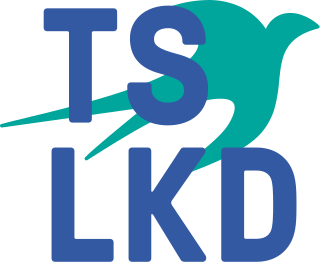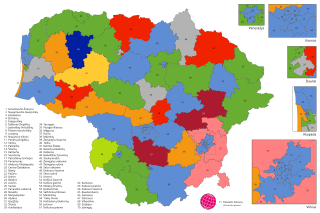
The Social Democratic Party of Lithuania is a centre-left and social democratic political party in Lithuania. Founded as an underground Marxist organization in 1896, it is the oldest extant party in Lithuania. During the time of the Soviet Union, the party went into exile, emerging once again in Lithuania in 1989.

The Liberal Union of Lithuania was a liberal political party in Lithuania.

The Seimas of the Republic of Lithuania, or simply the Seimas, is the unicameral parliament of Lithuania. The Seimas constitutes the legislative branch of government in Lithuania, enacting laws and amendments to the Constitution, passing the budget, confirming the Prime Minister and the Government and controlling their activities.

The Homeland Union – Lithuanian Christian Democrats, also known colloquially simply as the Conservatives, is a centre-right political party in Lithuania. It has 18,000 members and 49 of 141 seats in the Seimas.

Order and Justice, formerly the Liberal Democratic Party was a right-wing national-conservative political party in Lithuania that self-identified as "left-of-centre", at least on economic matters. It had eight members in the Seimas, the unicameral Lithuanian parliament, as of the last election it participated in (2016).

Democratic Labour Party of Lithuania was the renamed Communist Party of Lithuania. It was a political party in Lithuania in the 1990s, which claimed to be social-democratic. The youth organization of LDDP was called Lithuanian Labourist Youth Union.

Elections in Lithuania are held to select members of the parliament, the president, members of the municipal councils and mayors, as well as delegates to the European Parliament. Lithuanian citizens can also vote in mandatory or consultative referendums.

Parliamentary elections were held in Lithuania on 10 October 2004, with a second round on 24 October 2004 in the constituencies where no candidate won a majority in the first round of voting. All 141 seats in the Seimas were up for election; 71 in single-seat constituencies elected by majority vote and the remaining 70 in a nationwide constituency based on proportional representation.

Parliamentary elections were held in Lithuania on 12 October 2008, with a second round on 26 October in the constituencies where no candidate won a majority in the first round of voting. All 141 seats in the Seimas were up for election; 71 in single-seat constituencies elected by majority vote and the remaining 70 in a nationwide constituency based on proportional representation. Together with the elections, a referendum on extending the operation of Ignalina Nuclear Power Plant was held.

Parliamentary elections were held in Lithuania in two stages on 20 October and 10 November 1996. All 141 seats in the Seimas were up for election; 70 based on proportional party lists and 71 in single member constituencies. Where no candidate gained more than 50% of the vote on 20 October, a run-off was held on 10 November.

Parliamentary elections were held in Lithuania on 8 October 2000. All 141 seats in the Seimas were up for election, 71 of them in single-seat constituencies based on first-past-the-post voting; the remaining 70, in a nationwide constituency based on proportional representation. Altogether, around 700 candidates competed in the single-seat constituencies, while over 1,100 candidates were included in the electoral lists for the nationwide constituency.

Parliamentary elections were held in Lithuania on 14 October 2012, with a second round on 28 October in the constituencies where no candidate won a majority in the first round of voting. All 141 seats in the Seimas were up for election; 71 in single-seat constituencies elected by majority vote and the remaining 70 in a nationwide constituency based on proportional representation. Together with the elections, a referendum on the construction of a new nuclear power plant was held.

Parliamentary elections were held in Lithuania on 9 and 23 October 2016 to elect the 141 members of the Seimas. 71 were elected in single-member constituencies using the two-round system, and the remaining 70 in a single nationwide constituency using proportional representation. The first round was held on 9 October and the second round on 23 October.
The Sixth Seimas of Lithuania was the first parliament (Seimas) elected in Lithuania after it restored independence on 11 March 1990. Elections took place on 25 October 1992, with the second round on 15 November. In a surprisingly decisive outcome, the elections were won by Democratic Labour Party of Lithuania (LDDP), with 73 seats. The result reflected widespread dissatisfaction with the economic situation and the policies of the ruling Sąjūdis political movement in the preceding Supreme Council of Lithuania.
The Seventh Seimas of Lithuania was the parliament (Seimas) elected in Lithuania. Elections took place on 20 October 1996, with the second round on 10 November. The Seimas commenced its work on 25 November 1996 and served a four-year term, with the last session on 18 October 2000.
The Eighth Seimas of Lithuania was a parliament (Seimas) elected in Lithuania. Elections took place on 8 October 2000. The Seimas commenced its work on 19 October 2000 and served a four-year term, with the last session on 11 November 2004.
The Ninth Seimas of Lithuania was a parliament (Seimas) elected in Lithuania. Elections took place on 10 October 2004, with the run-off on 24 October. The Seimas commenced its work on 15 November 2004 and served a four-year term, with the last session on 16 November 2008.
The Tenth Seimas of Lithuania was a parliament (Seimas) elected in Lithuania. Elections took place on 12 October 2008, with the run-off on 26 October. The Seimas commenced its work on 17 November 2008 and served a four-year term, with the last session on 14 November 2012.
The Twelfth Seimas of Lithuania is a parliament (Seimas) in Lithuania. Elections took place on 9 October 2016, with the run-off on 23 October. The Seimas commenced its work on 14 November 2016 and served a four-year term, with the last session taking place on 10 November 2020.

Parliamentary elections were held in Lithuania on 11 and 25 October 2020 to elect the 141 members of the Seimas. 71 were elected in single-member constituencies using the two-round system, and the remaining 70 in a single nationwide constituency using proportional representation. The first round was held on 11 October and the second round on 25 October.










